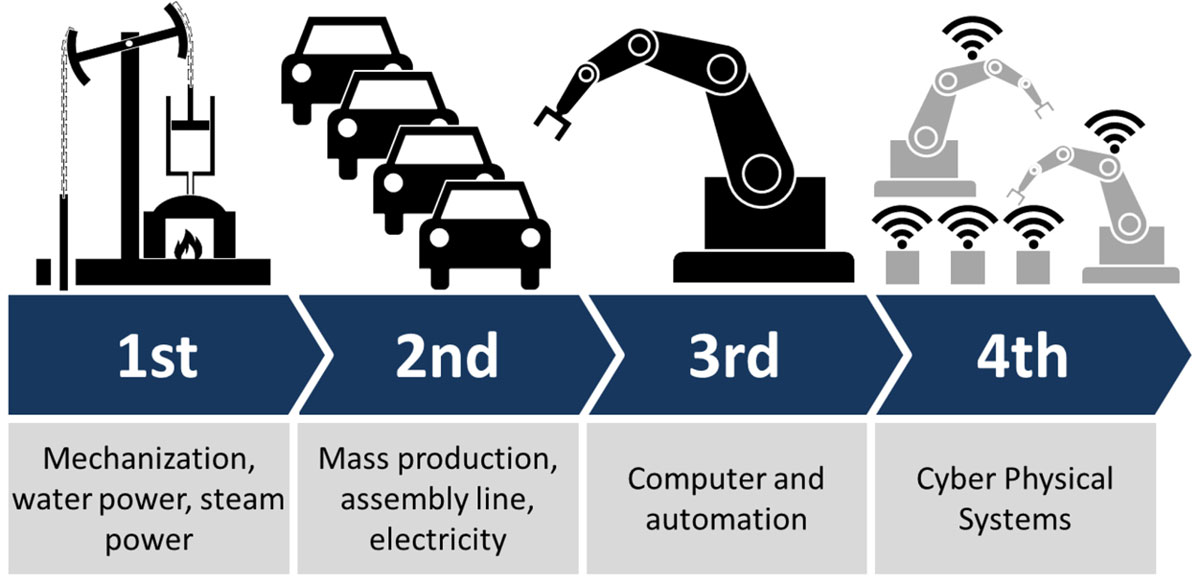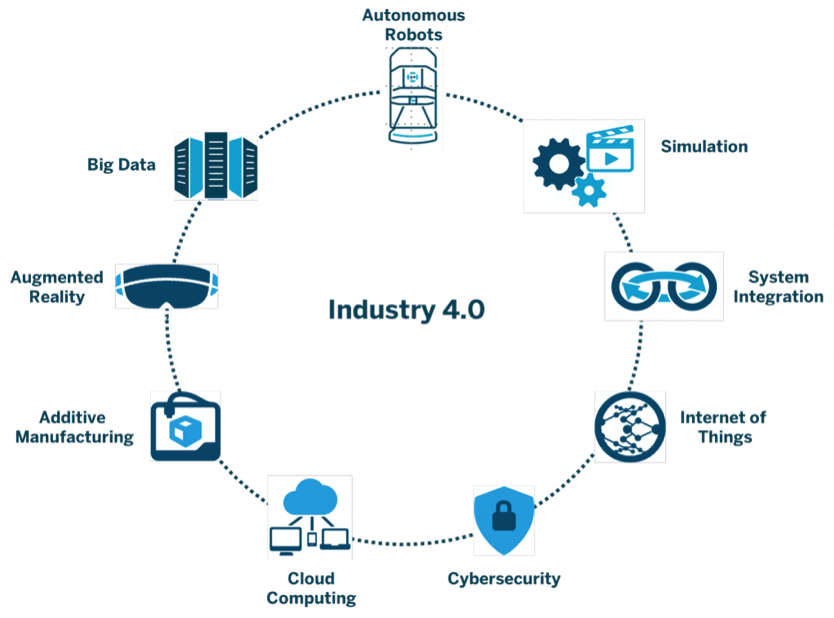
Legal Industry to Embrace Industry 4.0
 The last three revolutions can be listed as industrialisation, electrification and digitalisation. They were interlinked with continuity from one revolution to the next but the fourth industrial revolution (or so called Industry 4.0) is a distinct one and is evolving at an exponential rather than a linear pace. This brings with it, a transformational disruption in almost every industry.
The last three revolutions can be listed as industrialisation, electrification and digitalisation. They were interlinked with continuity from one revolution to the next but the fourth industrial revolution (or so called Industry 4.0) is a distinct one and is evolving at an exponential rather than a linear pace. This brings with it, a transformational disruption in almost every industry.
Boston Consulting Group’s infographic below shows the various dimensions of the fourth industrial revolution.
 While Industry 4.0 will have a large impact on many fields of law, it also brings with it legal challenges as well especially in robotics, big data, cyber security and IOT (includes blockchain). It circles around product liability issues, lack of liability coverage on an e-person (robot) versus on an individual and still grey areas relating to data ownership and data privacy. There’s just so much of scope for the legal industry in the new digital economy.
While Industry 4.0 will have a large impact on many fields of law, it also brings with it legal challenges as well especially in robotics, big data, cyber security and IOT (includes blockchain). It circles around product liability issues, lack of liability coverage on an e-person (robot) versus on an individual and still grey areas relating to data ownership and data privacy. There’s just so much of scope for the legal industry in the new digital economy.
With huge advances in the above area mentioned, demand for highly skilled workers in the areas of IT, Data Science and specialised sales will continue to surge while demand for rank-and-file workers with less education and lower skills will drop. There is a hollowing out happening in the middle layer. This means that new multi-disciplinary skills need to be acquired by our workforce who are compelled to deal with increasing ambiguity and uncertainty. The legal industry needs to be updated with the new skills too.
More than 35% of skills considered important today will have changed within the next five years. If Moore’s Law applies to employment, it would mean workers must master new sets of technology every two years or so. McKinsey estimates that 60% of future jobs would have more than 30% of activities automated by technology. Artificial intelligence and robotics will rebalance what jobs look like in the future. The International Bar Association, a global forum for legal profession set up in 1947, reports that competitive advantage due to cheaper workforces will soon be eroded by robot production lines and intelligent computer systems. The report illustrates with an example of a German car worker who will cost more than 40 Euros an hour versus a robot costing only between five to eight Euros. On top of it, machines will not fall sick or go on strike or have personal commitments. So, manual and routine tasks are more susceptible to automation while social skills are relatively less automatable. All these numbers further add weight to the importance of acquiring specific skills for the future economy whilst knowledge is becoming a commodity.
Drawing data from World Economic Forum as well as from our own experiences with organizations globally, the writer envisions the following skills to be very critical for the future economy:
- Be open to change, be the change and be adaptable to change. This is very critical especially now that we are faced with drastic unexpected circumstances all around us. The legal industry must be ahead in understanding the Industry 4.0 dimensions, what are the legal challenges they bring and how they can add value.
- Cognitive flexibility to switch between different types of thinking dimensions and mindsets. The flexibility should extend to being able to work across multiple disciplines and extract and integrate concepts from different fields. Knowing only the legal discipline will not cut it anymore. Some understanding of technology is a necessity now.
- Innovative and Adaptive thinking along with computational thinking and data analytics now that Big Data is a reality in our daily lives.
- Complex problem solving with a creative mindset and then make effective judgment calls to aid in robust data driven decision-making.
- Managing people the new age way. We can’t manage the millennials (who form part of the three generations who are co-existing in our workforce now) and the freelancing workers the same way we were managed decades ago. Traditional managerial and leadership frameworks and methodologies are gradually losing relevance and have to be revamped. The new age workforce largely comprises of contingent workers who prefer to work around the clock and not from nine to five. Sharing economy workers ought to be managed differently as well.
- Virtual collaboration. To do this effectively, we need literacy in various technological platforms. Lawyers from international firms now leverage various platforms to interact with clients and the whole model of charging for time is taking a new twist too.
- Emotional intelligence. This is needed both in real-life and in the virtual space. It has elements of self-awareness, self-management, intrinsic motivation, empathy and social skills.
- Advanced negotiation techniques. These will greatly aid in workplace, client-vendor environment and upward and downward management. Negotiating productively for win-win situations is essential.
- Service orientation. In Industry 4.0 or future revolutions, I highly doubt robots can offer a high degree of human touch and hence this will continue to be a key skill we need to possess.
- Technical entrepreneurship. This itself requires many skills and unique characteristics like risk taking, persistence, marketing savviness and coding skills to name a few.
Now that we have talked about the key skills needed for the future economy, we have to accept that even the process of acquiring these skills has moved beyond the traditional classroom setting. The writer increasingly sees law firms and other companies operating in legal-related sectors requesting for a blended learning approach to actively and effectively engage the workforce to upsklll them to get them ready to scale with the future economy. Our current training and development programmes for the legal industry covering various skills are delivered in a blended form of digital training (web and mobile technologies) and classroom training with heavy drills and focus on Industry 4.0. Interestingly we have noted that several professionals from the legal industry felt “awakened” and started understanding the urgency to learn the Industry 4.0 dimensions and dive into the critical skills needed.






